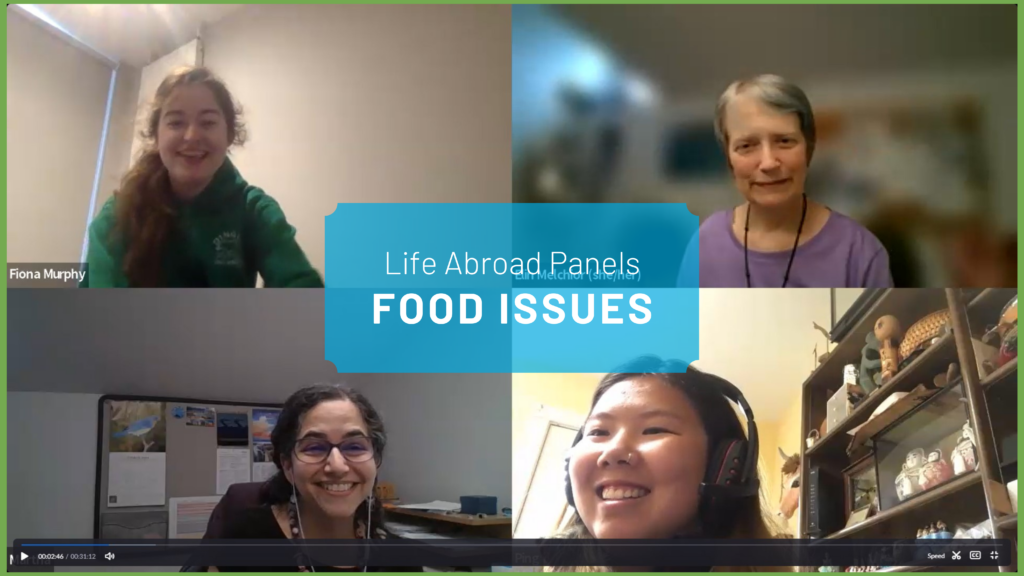
In April of 2023, The Champlain Abroad office hosted the Life Abroad Panels with the aim of providing valuable insights and support to students preparing for or interested in studying abroad. These panels cover several different topics such as Wellness, Identity (with WGC), Food Issues, Academic Issues, Social Interaction, Finances, and Homesickness. These panels will serve as a way to share experiences, tips, and guidance from both staff members and former students who studied and lived in different countries. We recognize that these are not the only concerns students may have when it comes to studying abroad, therefore we urge students to fill out the Life Abroad Questionnaire that is provided to them on TerraDotta after they are accepted into our programs. Here, students will be able to list their concerns and they are encouraged to reach out to our office to discuss them further. Our study abroad coordinators are always willing to meet with students to answer questions and address concerns. The office also hosts various events and activities that can help students ease the transition of going abroad. To stay updated on the events and/or to book an appointment with our coordinators, check out our Events page. Ultimately, the life abroad panels served as a useful tool to empower and prepare students for their international experiences and ensure a successful and enriching time abroad. Here is the recording of the panel discussing how to deal with food issues while being abroad (closed-captioning available).

Below you can find a brief outline of the panel which was held on Zoom.
I. Introductions
Elin Melchior introduces herself and the topic of the panel. Other panelists introduce themselves as well.
- Martha Moreno Linares, Study Abroad Coordinator. She is originally from Venezuela and studied abroad in Canada and the US.
- Ping Melchior, 3rd-year International Business major. Studied abroad in South Korea, Greece, and Thailand.
- Fiona Murphy, a 3rd-year Filmmaking major. Studied abroad in Montreal and Dublin.
- Elin Melchior, Study Abroad Coordinator. Studied abroad at the University of Warwick.
II. Part One: Initial Worries About Food
- Martha initiates the discussion by asking the panelists about their initial worries regarding food when studying abroad.
- Ping mentions that her non-spicy eating preference was a worry but found small mom-and-pop restaurants where they knew what she liked and were not afraid to try new things.
- Fiona shares how a café nearby her internship would shout her order when she walked in, with no interaction required, making her feel like a local.
- Elin adds that going to the same places over and over again builds familiarity, and she experienced this in Japan when people in her school cafeteria gave her a going-away present.
III. Part Two: Coping Strategies
- Martha asks the panelists about their strategies to cope with food issues.
- Ping suggests making friends with locals, who can recommend good restaurants or stores, and can help with language barriers.
- Fiona recommends being open to trying new foods and asking questions about the dishes.
- Elin suggests trying to cook or eat with a group of the students you are living with to learn more about cooking and to help each other out.
IV. Part Three: Final Thoughts and Advice
- Martha asks if any of the panelists have final thoughts on the topic or advice for future students.
- Ping reiterates the importance of making friends with locals and trying new foods.
- Fiona emphasizes the value of asking questions about the dishes and ingredients.
- Elin suggests that students do some research beforehand and come prepared with a list of dishes to try to cook.
- Elin also asks the panelists if they have any advice for students who are worried about food when studying abroad.
- Ping advises students to be open to trying new foods and not be afraid to ask questions.
- Fiona recommends that students be respectful of local customs and traditions around food.
- Elin suggests that students be prepared to step out of their comfort zones and try new things.
V. Conclusion
- The panel ends with a summary of the discussion and the key takeaways for students who are worried about food when studying abroad.
- The panelists emphasized the importance of building familiarity with local cuisine, trying new foods, and being open to learning about local customs and traditions..
Highlights:
- The panelists emphasized the importance of building familiarity with local cuisine, trying new foods, and being open to learning about local customs and traditions.
- Students should be open-minded and willing to try new things but also listen to their bodies and prioritize their health and well-being.
- Students should research the local food culture before arriving and prepare for any dietary restrictions or allergies they may have.
Links to Other Life Abroad Panels
- Wellness issues
- Identity issues
- Academic issues
- Social interaction issues
- Finance issues
- Homesickness issues
